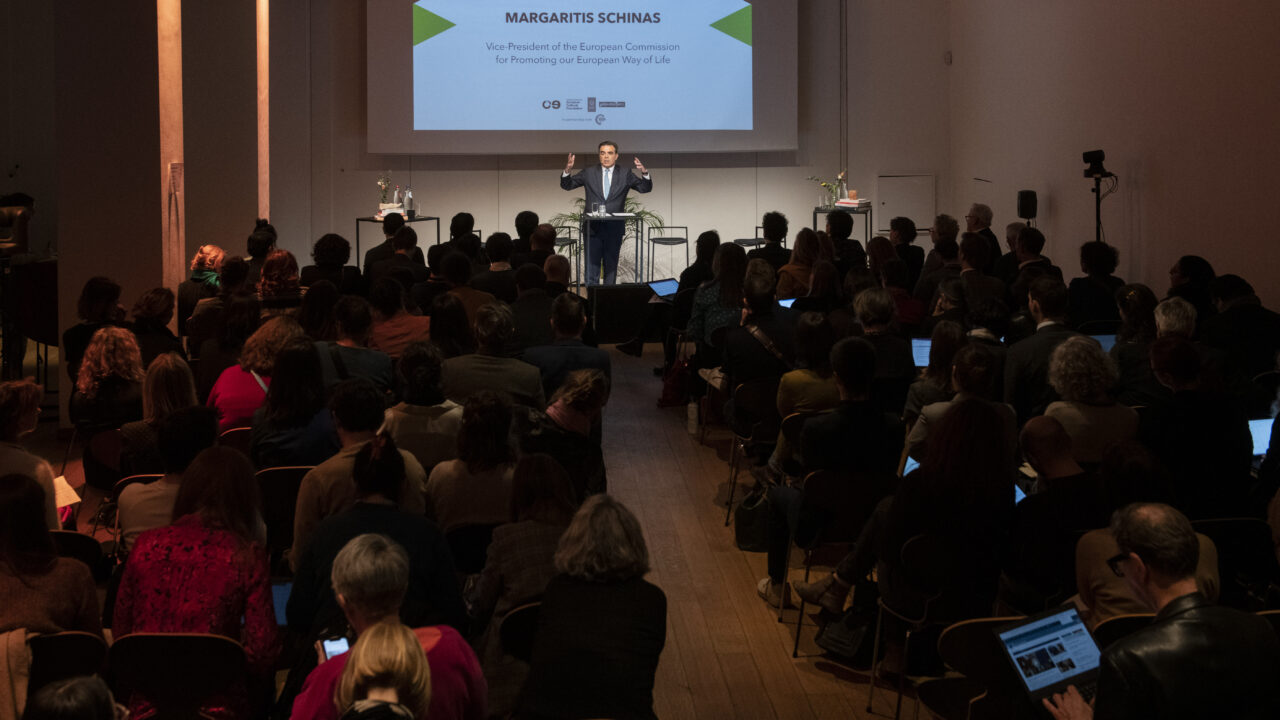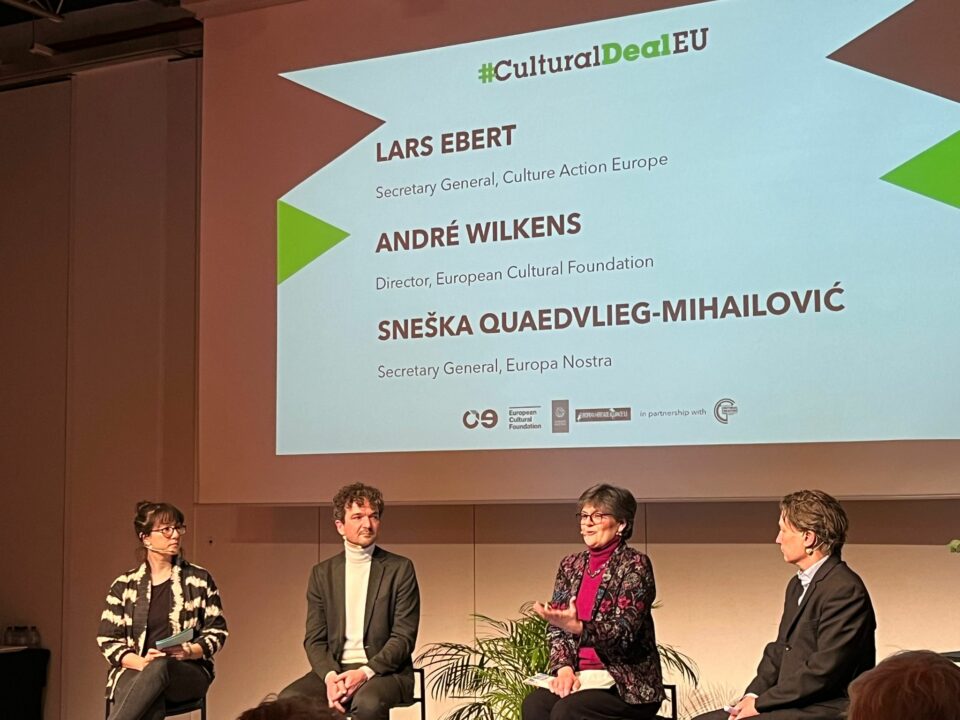Cultural Deal 2023: re-energising Europe to 2024 and beyond
8 Mar 2023

The third edition of the Cultural Deal for Europe Annual Policy Conversation, entitled Culture is the new energy for Europe took place on 28 February 2023 in Brussels, welcoming 135 participants on-site and 331 attendees online, in dialogue with three Members of the European Parliament (MEPs) and a keynote by the Vice-President of the European Commission Margaritis Schinas. The speakers all endorsed the need for a Cultural Deal for Europe, especially at a crucial time for the continent, following the Russian war against Ukraine and ahead of the 2024 European elections.
We co-organised the event with Culture Action Europe and Europa Nostra, also in its capacity as coordinator of the European Heritage Alliance, in the framework of the joint Cultural Deal for Europe campaign we initiated together three years ago. Since then, our Policy Conversations have established themselves as important annual rendez-vous for people across Europe, bringing together the cultural ecosystem and policymakers together to engage in a crucial dialogue on future-proof cultural policies for the EU and for the continent at large.
Culture is the new energy for Europe
This year’s event took place in Bozar, the Centre for Fine Arts in Brussels, to introduce a discussion on the specific calls for actions in our updated 2023 Cultural Deal for Europe joint statement A central place for culture in Europe’s future. Launched in November 2020, the campaign is an ongoing call from the wider European cultural community to acknowledge the pivotal role of culture in shaping the future of our lives and, ultimately, put culture at the forefront of all EU policy and political discussions.
Organised in cooperation with the Cultural Creators Friendship Group, a cross-party informal gathering of MEPs, the 2023 edition anticipated next year’s European Parliament elections to call for a prominent place for culture in the political parties’ platforms and manifestos. The exchanges with the MEPs and the public, both on-site and online, were clustered around three overarching themes: the future of Ukraine, democracy and citizens’ engagement in Europe, and sustainability & European Green Deal. Culture and cultural heritage need to be at the core of debates on the future of the European continent, and strategically associated in the collective effort ahead of the major democratic exercise in Europe: European Parliament 2024 elections.
Lars Ebert, Secretary General of Culture Action Europe, André Wilkens, our Director, and Sneška Quaedvlieg-Mihailović, Secretary General of Europa Nostra, opened the conversation, dedicating the event to the people of Ukraine. They then passed the microphone to three Members of the European Parliament: Sabine Verheyen (EPP, Germany), Chair of the CULT Committee, Alexis Georgoulis (The Left, Greece) and Marcos Ros Sempere (S&D, Spain), who took part in an interactive town hall discussion moderated by Katy Lee, journalist and co-host of The Europeans Podcast.
In his keynote speech, Vice-President Margaritis Schinas, responsibe for the Promotion of our European Way of Life, said: “In Europe, culture and the arts are at the heart of our core civic and social objectives. They impregnate what we stand for: democracy, freedom, tolerance, respect to what is different, belief in a project of coexistence, redressing the errors of history, and revisiting what is wrong about us and making it right.”
Towards a value-based and culture-driven Europe
In the context of the Russian war against Ukraine and the transitions facing Europe in general, André Wilkens of the European Cultural Foundation shared that: “There are many transitions in society and culture is key in all of them. You cannot address any of these big transitions in our society without culture. That is why we launched the Cultural Deal.“
“The Cultural Deal for Europe campaign is a platform open to everyone in the wider European cultural ecosystem to interact and engage with and to make the case for culture to be put at the heart of the policy-making in Europe,” said Lars Ebert of Culture Action Europe, recalling that the Deal is open for endorsements, and that its calls are fit to be featured in the European parties’ manifestos ahead of next year’s EU elections.
“The importance and urgency of our plea for a Cultural Deal for Europe is greater than ever. We cannot achieve peace, sustainability, social inclusion, and create a dialogue with the rest of the world without culture and cultural heritage,” underlined Sneška Quaedvlieg-Mihailović of Europa Nostra.
Ukraine
Ukraine was front and centre at the conversation, with the dire conditions of artists and cultural workers, the difficult situation for the cultural sector and the destruction and damage to heritage sites all in the spotlight. MEP Sabine Verheyen declared that “fighting for culture is fighting for keeping the identity of people intact. It is fighting for what keeps us together as a society,” commenting on the plea for a European Cultural Deal for Ukraine, included in the statement.
It is exactly why the Culture of Solidarity Fund, powered by the European Cultural Foundation, has launched two rounds of funding for cultural initiatives that, in the midst of turmoil and crisis, reinforce European solidarity with Ukraine and the idea of Europe as a shared public space.
We are also happy to see that the 2023 Creative Europe Annual Work Programme included a special set of actions of €5 million to support Ukrainian artists and cultural organisations to create and showcase their art and works and build their capacity, as Catherine Magnant, head of the Cultural Policy unit within the European Commission shared.

Cultural Deal for Europe campaign
Much has been achieved since 2019, when Culture was initially missing from the official title of a prospective European Commissioner, where it has been brought back after a strong campaign from the sector. Now, the Commission argues that culture is an integral part of its sustainability policy via the New European Bauhaus initiative.
Yet, MEP Alexis Georgoulis called for even greater ambition, to move from focusing solely on buildings and cities towards “bringing culture into every aspect, in order to create a mindset toward the green transition.” Looking at the future, MEP Ros Sempere added that “We want culture to prominently feature in the 2024 electoral campaign, especially the need to improve labour conditions for artists and cultural workers, and the right of access to culture for everyone, including newcomers and not just EU citizens.”
Before giving the floor to poet Amber Setta for an artistic reporting of the event, Chair of the European Parliament’s Education and Culture Committee Sabine Verheyen wrapped up the discussion with some closing remarks. “The European Union is more than a business club with legislative tools. It is something that brings people together, and it does it through cultural exchange. It is important to fight for a Cultural Deal, to implement culture in all our policies and have this as a common approach throughout the Union, because culture is what brings us forward.’’
